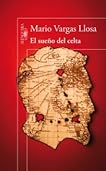 Stalins køer by Sofi Oksanen
Stalins køer by Sofi OksanenMy rating: 3 of 5 stars
Stalin’s cow is a goat! The Danish title of the debut novel "Stalins Køer", by Finnish writer Sofi Oksanen, is fantastic. It both means “Stalins’ cows”, but also “Stalin's queues” - those famous queues in front of the socialist stores, to which Oksanen makes frequent references. Those queues where did not matter what was sold, because anything was sold, everybody needed it. Otherwise, "Stalin's cow is a goat" is the sentence that actually refers to the essence of the novel: the depersonalization and disimulation of him/herself.
As in Purge (the book with which Oxanen won in 2010 the Nordic Council Prize for Literature), "Stalin's Cows" episodically describes the lives of three generations of Estonian women. The grandmother - survivor of the Stalinist nightmare from '40s-'50s, the mother – who, being raised in the full soviet era, succeeded to marry and escape in the neighboring, "enemy and capitalist country", Finland and finally the daughter - half western, half eastern, lost somewhere in between two worlds. Three generations of women who became traumatized by changes that more or less they could not control. Women who lost their individual freedom, but by dissimulation they did sharpen their self-preservation instinct. And loss of freedom seemed to evolve hereditary from the obligation, to the option.
In "Stalin's Cows" grandmother, Sofia, became kholhosnic and stahanovist because she had no choice. Mother, Katriina, had a choice and married a Finn, and became more Finnish than the Finn. Daughter, Anna, had apparently no choice since her mother forced her to hide their origin, because only like that she could avoid the "whore" label, which all Estonian and Russian women in Finland bore. And Anna ate, ate, ate and vomited, lied, and stole and hid from herself in a shrinking 50 kilograms body. The self-retrieval is the chance only for Anna, and it occurs with the return "home", return to the roots...
Oksanen is a gifted writer with a great force of evocation. She is honest, sometimes rough honest, brutal, and melancholic. Her prose ranges from the upper lyrical and naturalistic poetry to the most grotesque nostalgia. "Stalin's Cows" is worth reading, though the "Purge" is with one star atop.
View all my reviews


